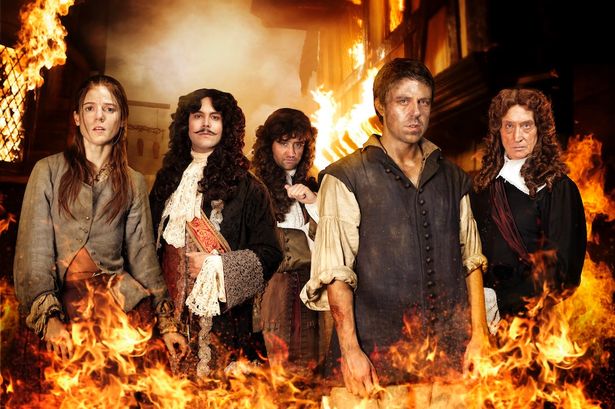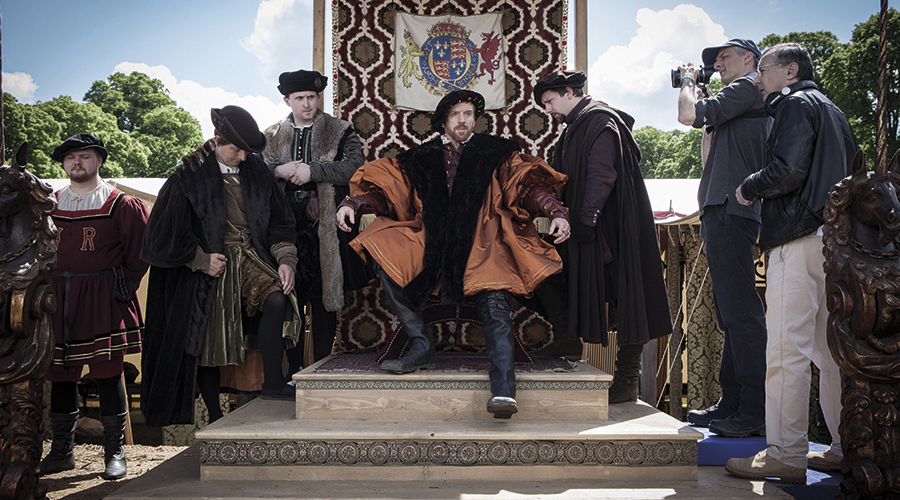With big-budget historical dramas like Wolf Hall and The Great Fire captivating audiences, questions about teleivision's duty to historical acuracy have been raised.
When it comes to historical dramas, we've been spoilt for choice.
From the post-war pomp of Downton Abbey, to Tudor power games in Wolf Hall and love triangles in The Great Fire, big-budget television has brought the past back to life.
But while colonial etiquette and codpieces have piqued our interest, drama's duty to historical accuracy has been questioned.
Whether it's the aesthetic details of Downton, or the representation of real characters in Wolf Hall, these programmes have come under tough scrutiny.
So where do you draw the line between fact and fiction?
"Where you get a problem is when you go from what is clearly a drama to something like Wolf Hall. After all, what is it? Is it pure fiction or is it purporting to be some sort of historical interpretation?" asks Richard Rex, lecturer in Reformation history at Cambridge University.
"There's no legal or even moral obligation on a fiction writer to restrict themselves to historical fact. But they have to accept that once they start piercing that veil, as it were, between the fictional and the historical then they lay themselves open to legitimate criticism."
Some have done just that. Historian and broadcaster David Starkey has denounced the Tudor series as a "deliberate perversion of fact" while the Bishops of Shrewsbury and Plymouth criticised it for its "perverse" and "anti-Catholic" character depictions.
But after all, it is just fiction. Even historian Lucy Worsley, Starkey's co-presenter in the upcoming BBC Two programme, A Night at Hampton Court Palace, proclaimed, "it's just a drama people" in a Telegraph column.
So is television's artistic licence completely without limits?
"I think there's a certain duty not to wilfully misinform," says Steve November, ITV's Head of Drama. "I think you've got to try and stay as close as possible [to what you know] whilst making sure that you entertain as well.
"To misrepresent the known truth is a different thing than to adjust detail"
"When we were doing The Great Fire we know we took enormous liberties because we don't actually know what happened. Whether [Thomas Farriner] was having a bit of an affair with his sister in law at the time, we don't know but it was a good old rollicking romance in the middle of an action movie."
There appears to be a line, though, that producers can easily cross when combining fact with reality. "To misrepresent the known truth is a different thing than to adjust detail or to embellish, or to provide what's missing, what's unknown," explains Rex.
"But when you take the big outlines of the past, and the central characters, and you misrepresent those, well, you're not really helping anybody when you're doing that."
While Wolf Hall has received adulation for its realistic lighting and white-toothed cast (sugar had not arrived to rot the court's teeth in the 1530s), criticisms have focused on the way it has tampered with known facts about the characters. Thomas Cromwell, largely viewed as a callous manipulator, is portrayed as a kitten-cuddling hero. Whereas Thomas More, now canonised, is presented as an inhuman sadist - keeping a brain damaged man in his house for the sheer amusement.
 The cast of ITV's The Great Fire (Credit: ITV)
The cast of ITV's The Great Fire (Credit: ITV)
It may seem like a small point, but some would argue that the general population forms its understanding and opinion of events based on fictional representations given in the media. "Most people's understanding of the past is from what they see in film and television," explains Richard Roberts, Professor of History at Kings College London. "So I think that does impose something of a responsibility on makers and broadcasters."
Television's influence may be vast. But should it be the responsibility of programme makers to ensure we get an accurate education?
For November it is down to the viewers, not the makers. "I think you do have to have some critical faculty as a consumer of anything - as a consumer of historical fact."
Stephen Conway, Head of History at University College London agrees. "We might be doing a disservice to the general television watching public in assuming that they can't distinguish fact from fiction."
Even with more fiction than fact, academics can't deny the benefit of these shows for popularising the past.
Hampton Court Palace, once the home of Henry VIII, is anticipating its visitor numbers to see a "Wolf Hall effect" similar to the surge of visitors experienced by Highclere Castle, where Downton Abbey is filmed.
"You're reaching people who don't ordinarily show an interest in anything to do with history and you're showing them that it can be interesting, fascinating," Conway explains.
"I think the bottom line is that it may well be doing some good."
By Rebecca Stewart

